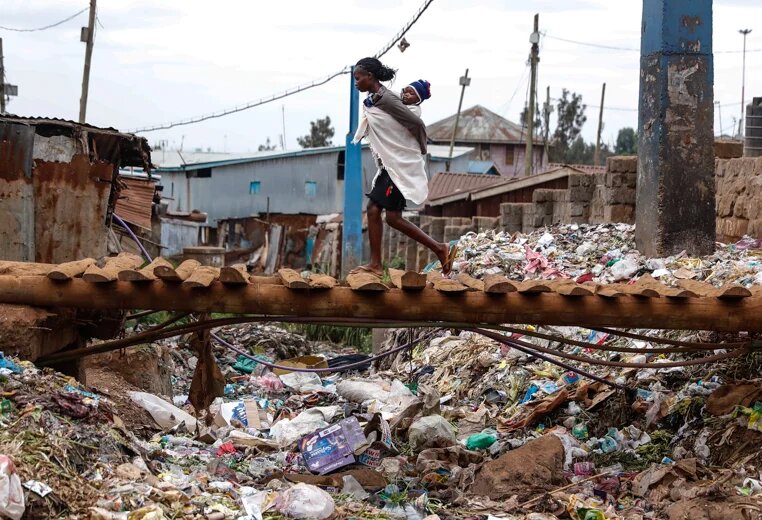As world leaders meet in Geneva, Switzerland, for the final round of the fifth session of the Intergovernmental Negotiating Committee on Plastic Pollution (INC-5.2) one truth must not be overlooked: Plastic pollution is also a gender issue.

As world leaders meet in Geneva, Switzerland, for the final round of the fifth session of the Intergovernmental Negotiating Committee on Plastic Pollution (INC-5.2) one truth must not be overlooked: Plastic pollution is also a gender issue.
While plastic waste chokes our rivers, poisons our soils, and invades our food, it also deepens existing gender inequalities, especially in Global South countries such as Kenya.
Women are a key population disproportionately affected by plastic, as highlighted in a 2021 UNEP report. Women face greater plastic-related toxicity risk due to higher aggregate exposure to plastics in domestic environments, waste pickers and through feminine care products. These risks include miscarriages, hormonal imbalances, cancer, and long-term reproductive complications.
Waste Pickers and Economic Deprivation
In developing countries such as Kenya, more women than men work as waste pickers, bearing the brunt of the impact of plastic pollution in unsafe and informal conditions. They collect, sort, and sell recyclables, often without protective gear, formal recognition or fair pay. Despite this, their role remains invisible and undervalued in a largely male-dominated industry that reflects entrenched patriarchal structures.
In Nairobi’s Dandora dumpsite for example, men control the most lucrative aspects of the trade. They own the trucks, determine where valuable waste is offloaded, and decide who gets access to what materials. The dumpsite is often informally segmented and ‘allocated’, with men dominating key sections and limiting women to lower-value or more hazardous waste. This restricts women’s economic agency and determines how much income flows back to their households, ultimately affecting their families’ access to food, education and shelter.
A recent report by Centre for Environment Justice and Development (CEJAD), titled 'Hazardous Chemicals in Plastic Products and Food Chain in Kenya' touched on the unique health risk women waste pickers face compared to their male counterparts. The report highlights toxic substances found in household items such as toys, hair products, kitchen items, and food, with which women are primarily in contact. It also notes that some of these persistent organic pollutants (POP) are listed under the Stockholm Convention for global elimination, such as Octa Brominated Diphenyl Ethers (OctaBDE), Decabromodiphenyl ether (DecaBDE) and Hexabromocyclododecane (HBCD).
Health Implications
The toxic byproducts of plastic decomposition while working in the waste fills pose serious health risks. Our engagement with women waste pickers reveals that respiratory and skin ailments due to prolonged exposure are common concerns. There is a strong correlation between endocrine-disrupting chemicals (EDCs) such as BPA and phthalates, commonly found in plastics, and adverse health outcomes, including infertility, hormonal imbalances, and pregnancy complications. Additionally, in many instances, women waste pickers have no choice but to bring their children to work, further exposing the minors to these harmful environments and compounding the health risks they face.
Policy and participation gaps
Women waste pickers are seldom included in waste management regulations. Policies are implemented without considering the specific needs and challenges faced by women in the informal waste sector, such as PPEs, fair pay, and safe working conditions that support gender equality, support sustainable livelihoods, and ensure environmental sustainability.
Formalising and integrating the informal waste sector into municipal waste management systems can provide women with job security, fair wages, and access to essential benefits. Recognizing their contributions as frontline workers and crucial players in environmental conservation and policy development is critical to dismantling systemic gender biases.
Empowering women through education and training programs is equally critical. We must enhance their understanding of the health risks associated with plastic pollution and develop programs that can equip them with the skills to transition towards safer and more sustainable waste management practices, breaking free from the cycle of hazardous work conditions while still earning a living.
National and county governments and other stakeholders must work together to develop policies that promote gender-equitable employment opportunities in the waste management sector, such as equal pay, safe working conditions, and opportunities for career advancement for women waste pickers. As the INC progresses towards a global plastics treaty, we must ask: Where are the women's voices most affected? Where is the commitment to gender-responsive policies and funding mechanisms?
National and global frameworks must ensure financing and technology access directly benefit women in the informal sector. The plastic treaty must address this.
Plastic pollution isn’t just an ecological emergency; it’s a gender justice issue. If the treaty being negotiated fails to include this lens, it will fall short of addressing the full scope of the crisis.